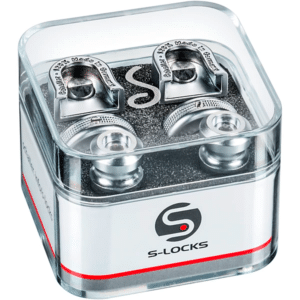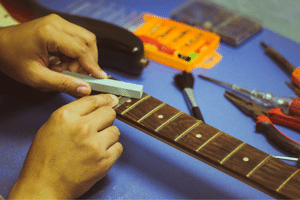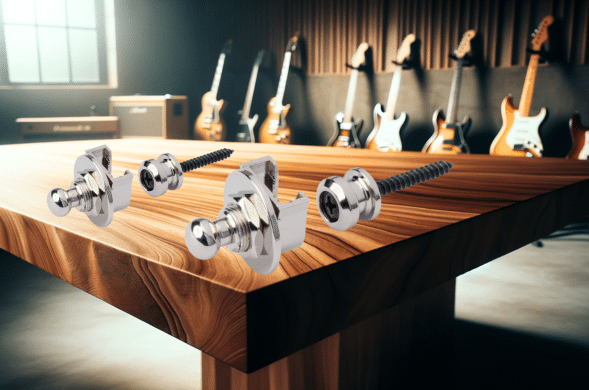Opinions tend to vary on the subject of “Are guitar strap locks necessary?” but Imagine the thrill of playing a flawless guitar solo when suddenly that moment is shattered as your guitar slips away, crashing to the ground! It happened to me, and this nightmare scenario is all too real for many other guitarists, but it can be easily avoided.
In this article, we’re exploring the need for a crucial safeguard for your beloved instrument and why understanding the importance of strap locks is essential. So, let’s dive in and discover how this tiny tool can make a huge difference in your musical journey.
The Short Answer
Guitar strap locks are crucial for any guitarist looking to protect their instrument from accidental falls and damage. They provide a secure connection between your guitar and strap, ensuring it stays in place during energetic performances or routine practice sessions. They are a small, affordable investment that offers significant peace of mind, whether you’re a beginner or a seasoned professional.
Key Takeaways

Here are the essential points to remember about guitar strap locks.
- Investment Protection: Guitar strap locks are essential for protecting your guitar from accidental drops, particularly vital for vintage or high-value guitars where repairs are costly and could alter the instrument’s original character.
- Versatility for Different Guitar Types: There are various types of strap locks available to suit different guitar models and player preferences, ensuring a suitable fit for almost any instrument.
- Simple Installation Process: The installation of most strap locks is straightforward and can be done at home, making it an accessible upgrade for guitarists of all skill levels.
- Suitable for All Playing Environments: Whether in a studio, at home, or on stage, strap locks provide security and peace of mind in any playing setting.
- Essential for Energetic Performances: For guitarists who engage in dynamic and vigorous playing styles, strap locks are particularly important to prevent the strap from slipping off mid-performance.
Keep On Reading (Below) To Learn More
Why Guitar Strap Locks Are Essential

Imagine the heartache of seeing your beloved guitar take a tumble because of a failed strap. Strap locks are crucial for preventing such nightmares. They securely fasten your strap to your guitar, ensuring it stays in place no matter how aggressively you play. When performing, the last thing you want is to worry about your guitar’s security. Strap locks provide that assurance, allowing you to focus solely on your performance.
I’ve been there, on stage, mid-riff, when suddenly my strap gave way, and my cherished guitar headed for a crash landing. Thankfully, it survived, but that scare was enough (more about this in my story below). I realized then that the safety of my instrument was non-negotiable. Since adopting strap locks, my confidence has soared. There’s a certain peace that comes with knowing your guitar won’t unexpectedly break free!
These locks are also essential during rehearsals and in the studio. They protect your investment from accidental drops, which can cause serious damage to your guitar’s body, neck, or electronics. This protection is especially crucial for vintage or high-value guitars, where repairs can be costly and potentially alter the instrument’s original sound and appearance.
Types Of Guitar Strap Locks
There’s a diverse range of strap locks available, each suited to different needs and preferences. Here are the main types:
- Clip-On Locks: These are beginner-friendly, easily clipping onto your existing strap buttons. They offer a balance of security and convenience, making them ideal for players who frequently switch straps between guitars. However, they may not provide the same level of security as more permanent solutions.
- Screw-In Locks: These replace your existing strap buttons with a robust locking mechanism. They’re extremely secure and ideal for players who perform vigorously. They require a bit of DIY spirit for installation but are worth the effort for the added security.
- Locking Straps: These straps come with built-in locking mechanisms, eliminating the need for separate hardware. They’re convenient and offer a streamlined look but may not fit all guitar types and are generally less customizable than other options.
- Custom and Proprietary Locks: Some brands offer their own versions of strap locks designed to integrate seamlessly with their instruments. These can range from simple clip-on systems to more elaborate designs.
My personal preference leans towards screw-in locks for their unparalleled security. I’ve equipped my Gibson Les Paul with these locks, and they’ve been rock-solid through countless gigs.
Related Article ➡ Best Guitar Strap Lock System Review – The Top 10 Winners!
Choosing The Right Strap Locks For Your Guitar
Selecting the right strap locks is crucial and depends on several factors. Your guitar’s weight, balance, and the type of strap you use all play a role. For heavier guitars, like a Les Paul, you need robust locks that can handle the weight. Also, consider the finish of your guitar – some strap locks may not be suitable for certain finishes and can cause wear or damage over time.
When shopping for strap locks, compatibility is key. Check if the locks are compatible with your guitar’s make and model. While many locks are designed to be universal, some guitars may require specific types or sizes.
For beginners, ease of use and installation should be top priorities. Look for locks that don’t require extensive modifications to your guitar. As you gain more experience and familiarity with your instrument, you can explore more advanced options that offer higher security and durability.
Also, consider the aesthetic aspect. Strap locks come in various finishes and styles, so you can choose ones that complement your guitar’s look. Whether you prefer a classic chrome finish or a more modern black or gold, there’s a style to match your instrument and personal taste.
Installing Guitar Strap Locks
Installing strap locks is a straightforward process, but it’s important to do it correctly to ensure your guitar’s safety. Here’s a general guide for screw-in type locks:
- Remove Existing Strap Buttons: Carefully unscrew and remove the existing strap buttons from your guitar. Be gentle to avoid damaging the wood.
- Fit the New Strap Locks: Position the new strap lock button where the old one was. If the screw doesn’t fit snugly, you may need to fill the hole with a wood filler or toothpicks and wood glue for a tighter fit.
- Secure the Lock: Tighten the screw to ensure the lock is firmly attached. Avoid over-tightening, as this can strip the wood or damage the finish.
- Attach the Lock to Your Strap: Most strap locks come with a piece that attaches directly to your strap. Secure this piece, making sure it’s tight and aligned properly.
- Test the Locks: Before you start playing, give the locks a few test tugs to ensure they’re securely fastened and your guitar is safely held.
While this process is generally simple, it’s crucial to follow the manufacturer’s instructions for your specific type of lock. If you’re not confident in doing it yourself, don’t hesitate to seek help from a professional guitar technician.
Are You Qualified To Make Guitar Adjustments Or Modifications?

It’s great to work on your guitars, especially if you have a lot of them, but you should always be aware of your limitations.
Adjusting things like an electric guitar’s string height (action) or pickup height can be straightforward. Still, some adjustments require the proper training and experience, like adjusting a guitar’s truss rod.
When you doubt your ability to adjust, repair, or modify your guitar, it’s always best to bring it to a competent guitar technician or luthier (guitar designer & builder). You can permanently damage your guitar, and it might never play and sound right again!
Making modifications to your guitar can void its manufacturer’s warranty and cause permanent damage to the instrument. Certain modifications are irreversible, so you may be stuck with them, even if you desperately want to restore the guitar to its original condition!
I learned that the hard way over the years until I did a three-year apprenticeship in a guitar repair shop. Now I have my own home workshop with the proper training and equipment to safely maintain and repair all my instruments.
Remember: “When In Doubt, Send It Out!”
Maintenance And Care For Strap Locks
Strap locks are durable but require occasional maintenance to ensure they perform optimally. Regularly inspect them for signs of wear or damage, especially if you play frequently or perform live.
If you notice any rust or corrosion, clean them carefully with a mild cleaner and a soft cloth. Also, periodically check the tightness of the screw and the condition of the strap part of the lock. Loose strap locks can be just as dangerous as no locks at all.
Be mindful of the environmental conditions where you store your guitar. Extreme temperatures and humidity can affect both your guitar and the strap locks. Store your guitar in a stable, controlled environment to prolong the life of all its components, including the strap locks.
My Personal Experience With Strap Locks
So, there I was, right in the middle of a critical recording session. I had my trusty Gibson Les Paul strapped on, ready to lay down one of the best solos I’d ever worked on. The energy was high, the band was in sync, and I was about to unleash some serious magic. But then, out of nowhere, my guitar strap lock failed!
Let me tell you, it’s not just embarrassing when your guitar suddenly drops in the middle of a killer solo; it’s a disaster. The strap lock, which is supposed to keep your guitar securely attached to the strap, just gave up on me. My guitar swung down, crashing against my knee. Thankfully, it didn’t hit the floor, but the take was ruined.
Here’s What I Learned And How I Dealt With It:
- Always Check Your Equipment: Before you start playing, whether it’s practice, recording, or a live gig, check your strap locks. Make sure they are tight and secure. I learned this the hard way.
- Invest in Quality Strap Locks: Don’t skimp on this. After that incident, I replaced the faulty lock with a high-quality one. I recommend looking at brands that are known for durability. It’s a small price to pay for peace of mind.
- Have a Backup Plan: Now, I always keep a spare strap and a set of strap locks in my guitar case. If something goes wrong, I can quickly fix it without disrupting the session or show.
- Stay Calm and Adapt: When the unexpected happens, don’t panic. I had to take a deep breath, refocus, and get back into the groove. The band members were understanding, and we nailed the take on the next try.
- Regular Maintenance: After that day, I made it a habit to regularly check and maintain all parts of my guitar, not just the strap locks. A well-maintained guitar is a reliable guitar.
So, that’s my story with a faulty guitar strap lock. It was a tough lesson, but it made me more vigilant about my gear. Always remember, your performance is only as good as the condition of your equipment. Stay sharp, stay prepared, and keep rocking!
Frequently Asked Questions
Here are some of the questions I get asked about guitar strap locks.
If your question does not appear here, please put it in the comments, and I will get right back to you with an answer.
What Are The Signs Of A Wearing Guitar Strap Lock?
Look for rust, loose parts, or difficulty in locking and unlocking. If your strap lock shows these signs, it might be time to replace it.
Can Strap Locks Affect The Resale Value Of My Guitar?
High-quality strap locks can actually enhance the resale value by making your instrument safer from damage.
Do Guitar Strap Locks Fit All Types Of Straps?
Most strap locks are designed to fit a wide range of straps, but it’s always best to check compatibility before purchasing.
Are There Any Strap Locks That Don’t Require Modification To The Guitar?
Yes, clip-on locks typically don’t require any modification to the guitar, making them a great option for those who prefer minimal changes.
How Often Should I Inspect My Guitar Strap Locks?
A quick check before each use is ideal, with a more thorough inspection every few months.
Can I Install Strap Locks On An Acoustic Guitar?
Yes, strap locks can be installed on acoustic guitars, but the process might differ slightly from electric guitars.
What Is The Average Price Range For Quality Guitar Strap Locks?
Good quality strap locks typically range from $15 to $40, depending on the brand and type.
Are There Strap Locks Designed For Children’s Guitars?
Yes, there are smaller strap locks available that are perfect for children’s guitars.
Do Guitar Strap Locks Come With A Warranty?
Many brands offer warranties, but it varies, so it’s important to check with the manufacturer.
Can Strap Locks Be Custom Made To Match My Guitar?
Some companies offer custom strap locks to match the color and style of your guitar.
Are There Strap Locks That Also Improve Comfort?
Some strap locks are designed with ergonomics in mind, offering added comfort as well as security.
How Do I Clean My Guitar Strap Locks?
Use a mild cleaner and a soft cloth, avoiding harsh chemicals that can damage the metal or finish.
Can I Use Strap Locks On A Bass Guitar?
Yes, strap locks are just as effective and necessary on bass guitars.
Is It Easy To Switch Strap Locks Between Different Guitars?
Depending on the type, some strap locks make it easy to switch between guitars, especially clip-on types.
Do Strap Locks Add Significant Weight To The Guitar?
No, strap locks are typically lightweight and don’t add noticeable weight to your guitar.
Can Strap Locks Be Used On Leather Straps?
Yes, strap locks can be used with leather straps, but ensure the lock fits the strap’s thickness and width.
What Should I Do If My Strap Locks Get Stuck?
Apply a small amount of lubricant and gently wiggle them free, but avoid forcing them to prevent damage.
Do Professionals Prefer A Specific Type Of Strap Lock?
Professional guitarists often prefer screw-in locks for their reliability, but preferences can vary based on individual needs and playing style.
Putting It All Together
Are guitar strap locks necessary? Absolutely! These small tools are super important for keeping your guitar safe. They stop your guitar from falling and getting broken, which is especially crucial if it’s an expensive or old (vintage) one. Strap locks make sure your guitar stays hooked to your strap, even when you’re moving around a lot or playing really hard.
Strap locks come in different types, like clip-on and screw-in locks. You can pick what works best for your guitar and your style. They’re also pretty easy to put on your guitar yourself. Plus, you can find them in cool colors and styles to make your guitar look even better.
Remember, taking care of your strap locks is just as important. Check them often to make sure they’re not loose or broken. This helps them last longer and keep doing their job well.
So, strap locks are a big deal for any guitarist because they are a small investment that can save your guitar from big trouble. Whether you’re just starting or you’ve been playing for years, getting strap locks is a smart move for you and your guitar.
Add a video?

Here’s a video from Fender that shows you how to install their strap locks. Check it out!
What’s On Your Mind?
Here’s where you get to give me your take on guitar strap locks! Don’t hold back if you have something to say or there’s a question you need answered. Jump right into the comments section below, and let it rip!
Have you had a strap mishap or a success story with strap locks? Share your experiences in the comments below. Let’s help each other keep our guitars safe and sound!
- Do you use guitar strap locks? Why or why not?
- What is your favorite type of guitar strap lock?
- After reading this article, are you thinking of getting strap locks?
- What else is on your mind?
I’m here to help!


